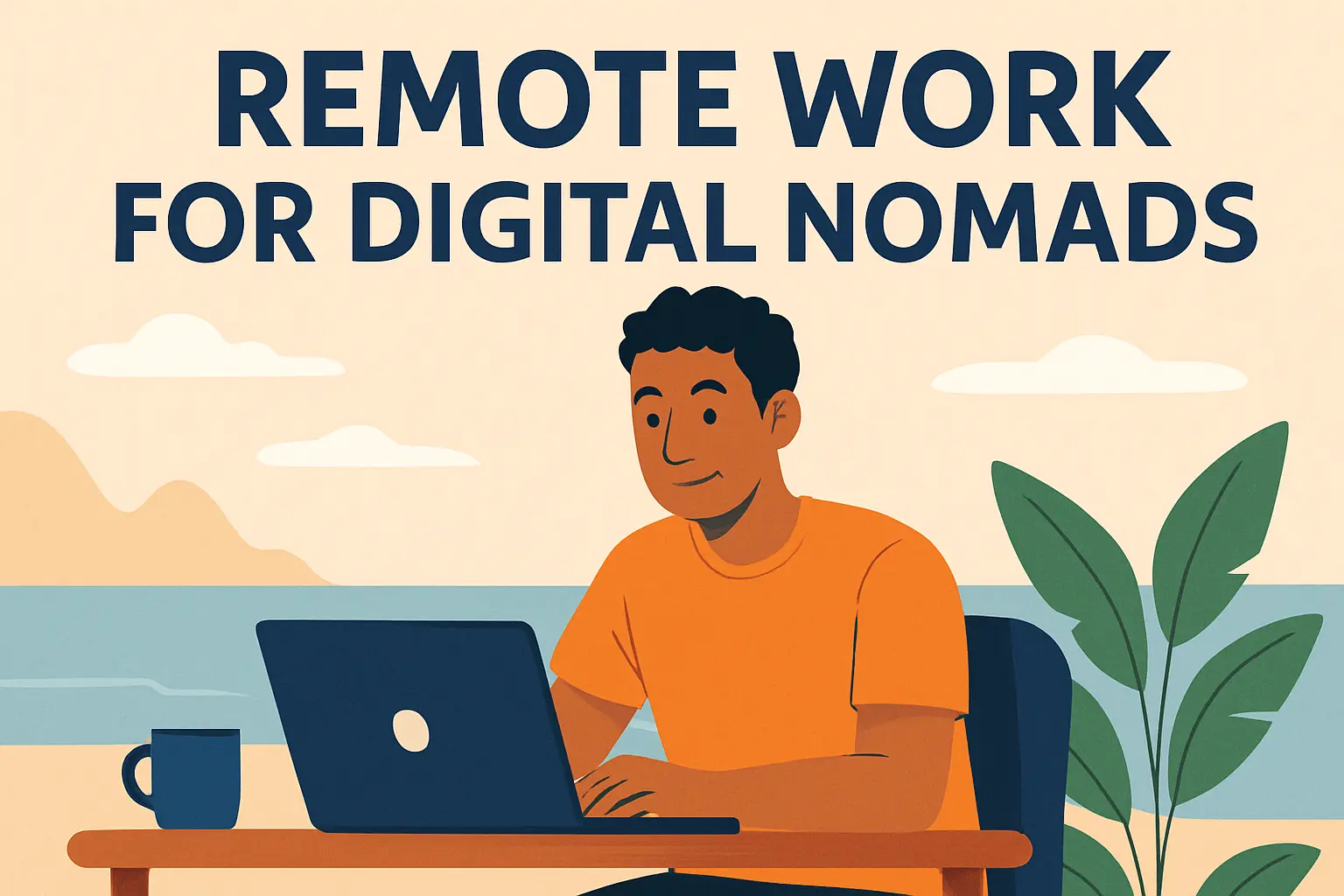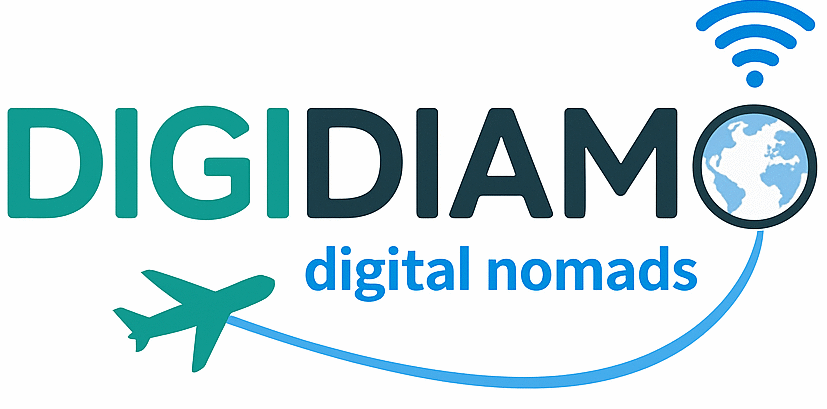Remote job opportunities for digital nomads in 2025
Remote work has grown from a side trend to a normal way of earning a living. For people who travel often or want to design a flexible life, the number of remote job opportunities has never been higher. Employers no longer expect everyone to sit in one office. They look for results, discipline, and curiosity. That shift is a gift for digital nomads who want to work while moving between cities or countries. If you are exploring how to fit remote work into a lifestyle that mixes freedom with income, the complete remote work for digital nomads guide shows the big picture of how jobs, tools, routines, and destinations connect.

What makes a job remote friendly
A remote friendly job is not only about working outside of an office. It has to meet a few conditions that make it sustainable while traveling.
- Output is measured by results, not hours spent at a desk.
- The work does not depend on being tied to one location.
- Pay should cover the cost of living in mid-range cities at least.
- Tools should run on a laptop with cloud access.
When a role checks all these points, you avoid stress about time zones, contracts, and paperwork.
The main job models
Remote job opportunities fall into several models. Each has its own pros and cons depending on how you like to work.
| Job Model | Example Roles | Pros | Cons |
|---|---|---|---|
| Freelance gigs | copywriter, designer, video editor | freedom, set your rates, choose clients | income swings, need to find clients |
| Salaried remote roles | developer, support rep, marketer | stable paycheck, benefits | less flexibility, time zone overlap required |
| Part-time retainers | designer, growth consultant | steady hours, side projects possible | income not as high as full salary |
| Contractor agreements | consultant, project manager | higher gross pay, independence | handle taxes, insurance yourself |
| Micro tasks and platforms | testing, surveys, transcription | easy entry, fast cash | very low income, not sustainable long term |
This mix means you can choose what fits your stage of life. Some nomads prefer freelancing for freedom, while others like the safety of a regular paycheck.
High demand roles for 2025
Remote work now covers almost every field, but some roles stand out because demand is high and barriers to entry are low.
- Customer support and success: Companies hire support reps worldwide to cover different time zones. Clear communication and patience matter more than a degree.
- Freelance writing and editing: Brands publish content daily. If you can write with clarity and adapt to tone, work is steady.
- Design and UX: Remote teams always need visuals, user flows, and smooth digital experiences. Portfolios matter more than your location.
- Development and product roles: Coding remains one of the highest paying portable skills.
- Online education and coaching: Tutors and mentors can run sessions over Zoom or create recorded courses.
Entry level paths
Many people ask how to start if they have little or no experience. The truth is that some jobs welcome beginners as long as you bring motivation and consistency.
- Virtual assistant: Handle emails, calendars, and bookings for busy entrepreneurs.
- Transcription: Turn audio files into text. Accuracy is valued over degrees.
- Data entry: Simple tasks that need focus but little background knowledge.
- Online chat agent: Manage support through text, juggling multiple conversations at once.
These roles may not pay much at first, but they are stepping stones. After three months you can pivot to better paid work if you learn new tools and keep building reviews.
Platforms to find work
Finding reliable jobs requires knowing where to look. Job boards and platforms specialize in remote listings.
- We Work Remotely: Tech and creative roles across the globe.
- Remote OK: Filters jobs by pay and time zone overlap.
- FlexJobs: Paid membership but listings are screened against scams.
- Upwork and Freelancer: Large pools of projects, but competition is heavy.
- Contra and TopTal: Target premium freelance gigs if you can pass the vetting.
A good strategy is to combine one or two job boards with direct outreach to companies you admire.
Crafting a profile that works
Remote applications are different from traditional ones. Recruiters want proof you can deliver without supervision.
- Lead with outcomes, not tasks. Example: “increased traffic by 20 percent through SEO content” instead of “wrote blog posts.”
- Add your time zone in UTC format to show awareness of overlap.
- Use a short video intro to build trust faster.
- Keep your CV location neutral. Emphasize results, not where you worked.
Dealing with time zones
Time zone management is often overlooked but it makes or breaks remote jobs. If you are in Morocco and your clients are in Europe, overlap is smooth. If you want to work with US west coast teams while in Asia, be ready for late night sessions.
Use tools like World Time Buddy to map overlap and agree on fixed windows for meetings. Many digital nomads fix four anchor hours daily, then use the rest for flexible work or travel.
Income stability
Remote income can swing if you depend only on short gigs. The best approach is to layer your income.
- One anchor client or job that covers base living costs.
- Side projects that add extra income in good months.
- Productised services like audits or templates that can be sold repeatedly.
Payment tools like Wise or Payoneer reduce friction when receiving money abroad. Automated invoices save time and help you get paid on schedule.
Soft skills that matter
Remote jobs rely less on technical certificates than on soft skills. These make you stand out.
- Asynchronous communication: writing clear updates that cut down video calls.
- Self management: planning tasks without a manager nearby.
- Cultural sensitivity: working smoothly with people from five continents.
- Resilience: staying calm when flights are delayed or internet drops.
These skills are hard to measure but easy to notice in daily work.
How to grow while you earn
The best digital nomads keep learning. Short courses, mentorship, and contributing to open source projects all keep your profile strong. Treat every contract as both income and practice. Even a small freelance gig can open doors to a salaried role later.
Red flags in remote job ads
Not every job that claims to be remote is healthy. Walk away from roles that:
- Ask you to sit on Zoom eight hours straight.
- Offer only crypto payments with no written contract.
- Provide no clarity on holidays or health benefits.
- Include restrictive non-compete clauses that limit future work.
Avoiding these traps saves time and stress later.
Practical budgeting
Remote job hunts take time. It is smart to keep at least three months of living costs before quitting an office job. Slow travel hubs like Chiang Mai or Bansko stretch your budget while you search. A buffer reduces pressure to accept low offers.
Conclusion
Remote job opportunities in 2025 are wide open for digital nomads who want to balance freedom with income. The key is to pick a model that fits your lifestyle, build trust through small wins, and keep learning. If you want to focus on the kinds of jobs that require little experience and help you start fast, our guide on top remote jobs you can start with no experience gives you the best entry points.






